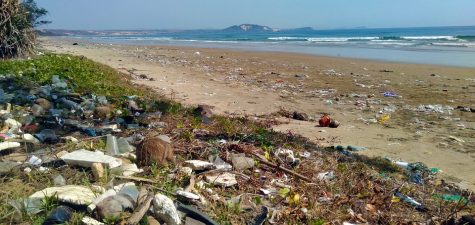Pollution becoming greater problem, more must be done
April 14, 2020
Despite all the supposed pollution-stopping trends on social media, not enough hands-on help is offered to fix the worrisome state of marine pollution. Every day more waste ends up in the ocean: an estimated 176 billion pounds of trash every year according to Conservation International, and it’s decreasing. In order to save marine life and the environment, the world as a community must make larger adjustments, as it should have long ago– it’ll take more than a metal straw to preserve the oceans.
A study in 2017 found that the average American produces 4.40 pounds of daily waste, and 300 million tons of plastic a year. Fifty percent of which is single-use utilities. Plastic is used nearly everywhere in the modern world in ways commonly overlooked. A portion of these places have banned things like plastic bags or straws; Hawaii being the first to enforce the law with plastic bags. Although this is a massive step forward, the state of pollution would only begin to decrease once more states or countries were to move forward with similar bans. To drop it further, factories and plantations must comply and find more eco-safe ways of manufacturing. The problem with this is money— it would cost businesses to stop completely or change what they’ve been doing, and both ways would mean a loss of income.
Before 1972, humans spewed trash, sewage, chemical waste and radioactive waste into the ocean without repercussions, an article by National Geographic states. Although it’s illegal, the population continues dumping pollution, due to carelessness or a lack of space to put it. It’s assumed that by 2050, all the plastic left in the ocean will outweigh the fish. There’s so much waste left because all that stays in the water is what’s unable to biodegrade– plastics. Fortunately, inventions have been proposed to act on these issues; they just have yet to become widespread. A machine called the “Giant Pack-Man,” made by Boyan Slat, is the first trash-collecting invention developed to limit the plastic waste in ocean waters. Since then more ideas have emerged, like mesh nets to catch garbage before it reaches open water or types of plastic the water can break down. These methods are extremely effective, but as humans continue to produce more waste it isn’t a lasting solution.
A lot of plastic items have longer-lasting alternatives, but to make the small switch takes commitment worldwide. Items of the sorts can do major and irreversible damage on ecosystems and have been without any serious recognition. Plastic kills 100,000 marine creatures every year from entanglement and ingestion, and that’s only what’s recorded. Approximately two million seabirds die as well, and it diseases 4-89 percent of corals. These ecosystems are already victim to humanity due to acts like mutilation and illegal poaching that endangers species to extinction. The most familiar example is sea turtles and how straws have impacted them, but the cases are endless and constant. The pollution humanity causes is wiping out life that’s existed as long as the world has, purely out of careless actions.
These changes won’t work unless society cooperates and makes the adjustments needed for transformation. Until then, it will remain a personal choice— to use a plastic fork, or to use a bamboo alternative. These changes cost less than what disposable plastics cost, but it’s the commitment that’s the issue. It’s something everyone struggles with. Putting in these bans and rules only assist the transition.
It cannot be determined when it will be too late to save, but it’s only common sense to assume that if society continues this way it won’t be as long as it should. While not all changes can be made (due to personal status), simply being aware of the impact and making a difference is universal. When possible, switch to paper bags or go for a reusable kind, look online to see if plastic appliances can be repurposed rather than thrown away. These aren’t life altering changes, but if everyone were to do what they could– even when small –the impact would be a step towards the help the ocean needs.

Garbage lines the shore of a beach. New solutions need to be taken more seriously to stop the problem from growing.



